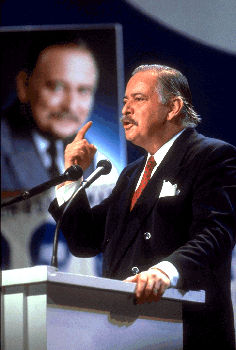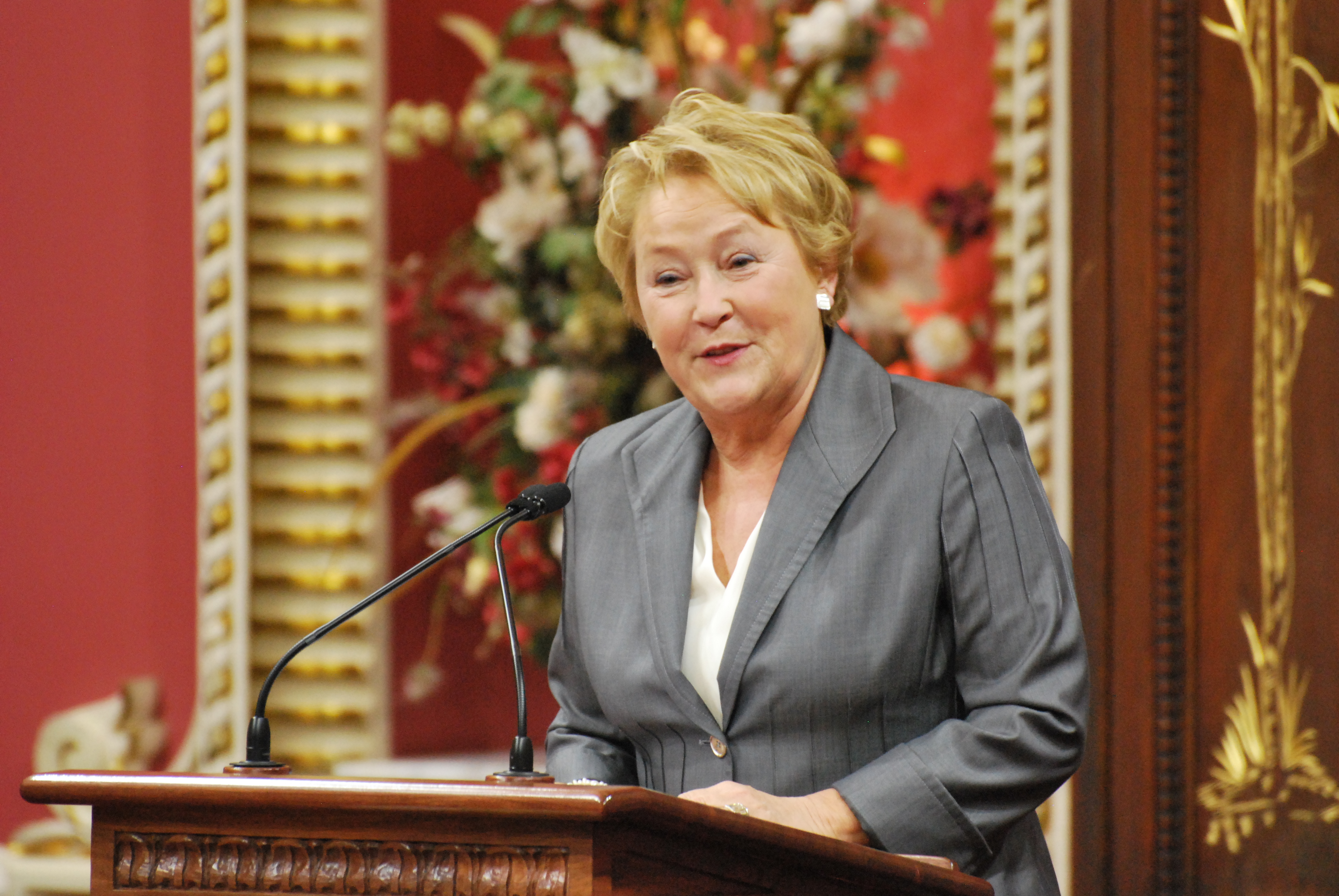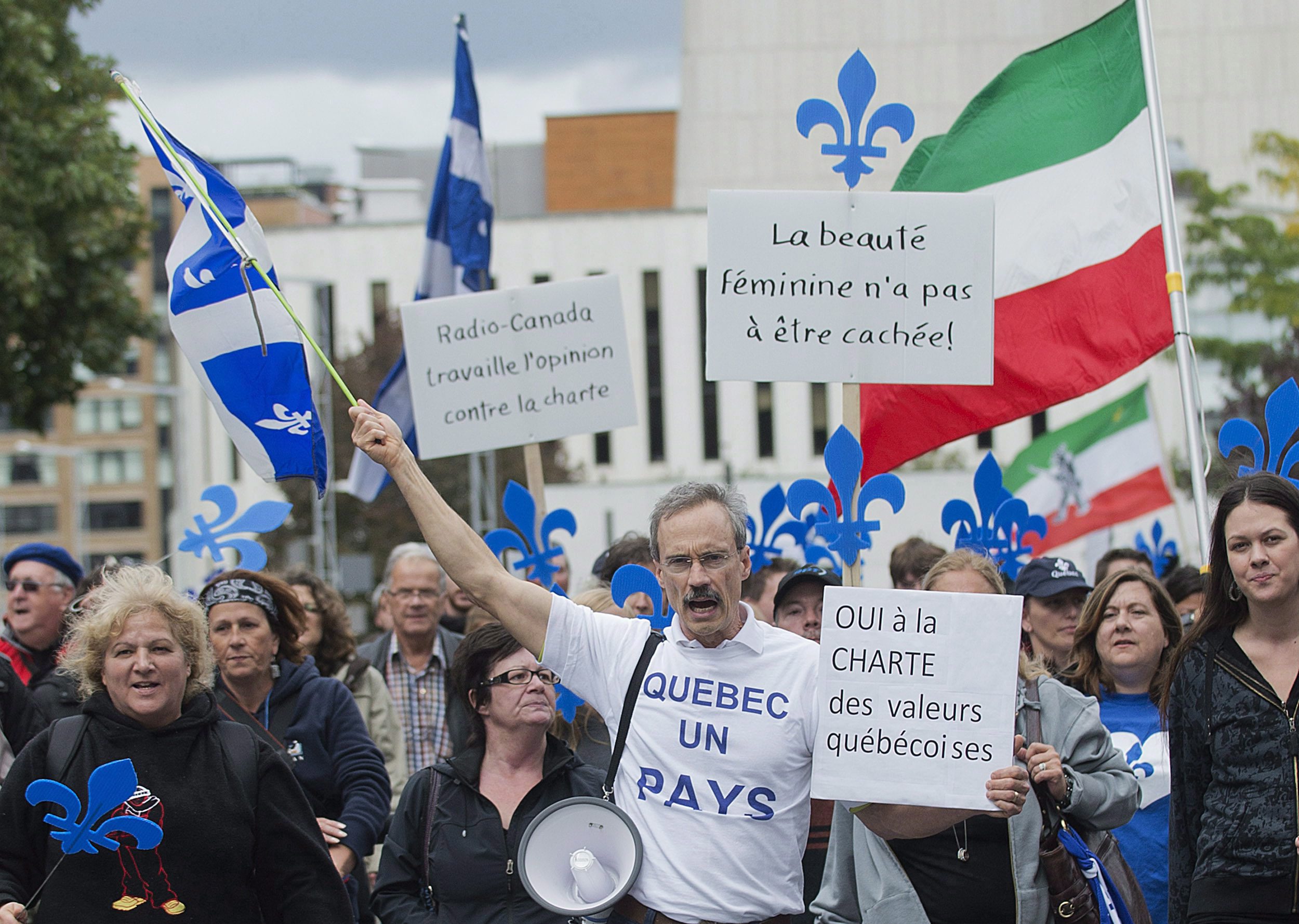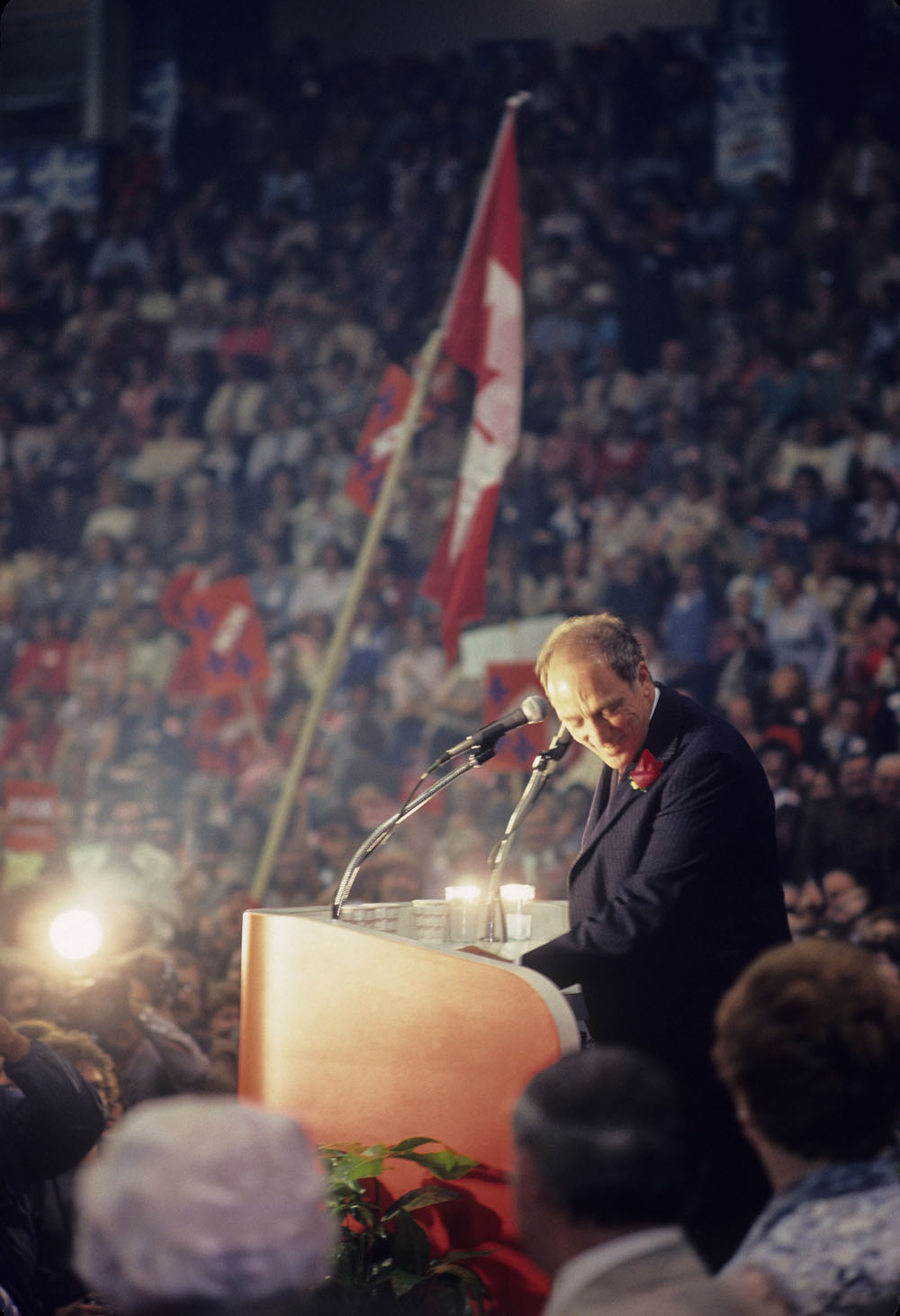The Parti Québécois (PQ) is a nationalist (see Francophone Nationalism in Quebec) political party formed in Quebec in 1968 through the merger of the Mouvement souveraineté-association (see Sovereignty-Association) and the Ralliement national. René Lévesque was the PQ’s first leader and held that position until 1985. The party was elected to its first term in office in 1976 and went on to hold two referendums on Quebec sovereignty: one in 1980 and the other in 1995. (See Quebec Referendum (1980); Quebec Referendum (1995).) Since October 2020, the party leader is Paul St-Pierre Plamondon.
Founding
The Parti Québécois (PQ) was founded on 14 October 1968 through the merger of the Mouvement souveraineté-association (MSA), led by René Lévesque, and the Ralliement national (RN), led by Gilles Grégoire, a former Créditiste Member of Parliament.
The MSA was founded in November 1967, following a Quebec Liberal Party policy convention where René Lévesque (then minister of Natural Resources in the Liberal provincial government of Jean Lesage) and other party members who were also Quebec nationalists tried to gain acceptance for a program entitled Pour un Québec souverain dans une fédération canadienne (“For a sovereign Quebec in a Canadian federation”). Failing at this effort, they decided to quit the Liberal Party and form their own movement.
In 1968, the MSA negotiated a merger with the Ralliement national (RN). The RN, founded in March 1966, was itself the result of the merger of the provincial wing of the Ralliement créditiste with the Regroupement national. The RN claimed to be inspired by Pierre Bédard’s Parti canadien, Louis-Hippolyte LaFontaine’s Parti canadien-français, l’Action libérale nationale and the Bloc populaire canadien. The RN received only 3.2 per cent of the votes in the Quebec general election of 5 June 1966. Gilles Grégoire became its president on 21 August 1966.

The militant base of a third party, the Rassemblement pour l’indépendance nationale (RIN), also contributed to the founding of the PQ. The RIN had begun as a citizen movement in 1960, and in 1963 it became the first pro-independence political party in Quebec’s history. Pierre Bourgault became its leader in May 1964, and it took 5.6 per cent of the votes in the provincial election of 1966. But Bourgault did not endorse the idea of sovereignty-association promoted by René Lévesque — for the RIN, unilaterally declared independence (see Separatism) was the only acceptable option. Hence the negotiations between the RIN and Lévesque’s MSA failed. The RIN did not merge with the MSA and the RN, but instead was dissolved in 1968, and its supporters were invited to join the PQ.
This new pro-independence party thus became the rallying point for almost all Quebec nationalist movements and associations. It established a national executive council, developed its infrastructure, and built a rapidly growing network of party members. Other major Quebec nationalist organizations that supported the PQ included the Société Saint-Jean-Baptiste and the Mouvement national des Québécois.
First election victory
In the first two elections in which it participated, the PQ achieved very limited success. In 1970, it won 23.5 per cent of the popular vote, but only seven seats in the National Assembly. The first seven PQ members of the National Assembly and the ridings that they represented were as follows: Camille Laurin (Bourget), Guy Joron (Gouin), Marcel Léger (Lafontaine), Robert Burns (Maisonneuve), Lucien Lessard (Saguenay), Charles-Henri Tremblay (Mercier et Sainte-Marie), and Claude Charron (Saint-Jacques).

In Quebec’s 1973 provincial general election, the results were even more disappointing for the PQ: only six PQ candidates were elected, even though the party took 30.2 per cent of the popular vote, while the Liberals, led by Robert Bourassa, took 102 seats out of 110. But in 1976, the PQ finally emerged victorious, trouncing the Liberals while capturing 41.4 per cent of the vote and 71 seats. The PQ victory was attributable largely to an electoral strategy nimbly executed by Claude Morin, in which the party promised to hold a referendum on sovereignty-association during its first term in office.

The PQ passed many important pieces of legislation during this first term. Bill 101, the Charte de la langue française (Charter of the French Language), made French the sole official language of Quebec (see Quebec Language Policy). The Act Respecting the Preservation of Agricultural Land and Agricultural Activities was passed in 1978, and the complementary Act Respecting Land use Planning and Development was passed in 1979. In 1978, the Automobile Insurance Act was passed, creating a government-managed system of no-fault compensation and property damage insurance for automobile owners. The Parti Québécois government also passed Bill 89, establishing a new Civil Code and reforming family law (1980).
Referendum of 1980
The referendum on sovereignty-association that the PQ had promised during the 1976 election campaign was held in May 1980 (see Quebec Referendum (1980)). After a televised debate on the subject in the National Assembly, numerous public meetings were held. The opponents of Quebec’s negotiating sovereignty-association with the rest of Canada — the “No” side — took 60 per cent of the votes, beating the “Yes” side handily by a 20-point margin. Despite this failure, the PQ was returned to power in the 1981 elections, with 80 seats and 49.2 per cent of the votes.
In a consultative referendum of PQ members, René Lévesque won support for the party to set the question of sovereignty-association aside temporarily, but lost the support of a group of dissidents who refused to accept this result. In November 1984, the PQ government was shaken by the resignation of a group of pro-independence ministers including Jacques Parizeau. René Lévesque resigned the leadership of the Parti Québécois in June 1985 and was replaced as PQ leader and Premier of Quebec by Pierre-Marc Johnson in October 1985.
In the December 1985 elections, the PQ experienced a shattering defeat at the hands of Bourassa’s resurgent Liberals, receiving only 38.7 per cent of the vote and retaining only 23 seats in the National Assembly. In November 1987, one week after the death of René Lévesque, Pierre-Marc Johnson resigned as PQ leader. Jacques Parizeau, a stauncher champion of independence, was the main contender to replace him and became party leader on 19 March 1988.
Years in Official Opposition
Both in government and as Official Opposition from 1985 to 1994, the Parti Québécois took an ambiguous posture, attacking the federal system from which it hoped to separate, while also trying to take advantage of it as much as possible. The party’s position during the Fall 1981 federal-provincial constitutional negotiations on the patriation of the Constitution was a good example. Quebec joined seven other provinces in opposing the Pierre Elliott Trudeau government’s plan to patriate the Constitution first and reach a new agreement about it with them second. But the other dissident provinces ended up accepting a new constitutional agreement, leaving Quebec isolated. Even after Robert Bourassa’s Liberals were returned to power in Quebec’s 1985 elections, the province refused to ratify the constitutional agreement unless it received new concessions.
In the Quebec general election of 1989, the Parti Québécois proposed to hold a series of “sectoral referendums” on individual constitutional jurisdictions such as language if it took power, but lost to Bourassa’s Liberals again, carrying only 29 seats and receiving 40 per cent of the vote. Polls showed support for the sovereignist option rising once more, however, in the wake of the failure of the Meech Lake Accord on 22 June 1990. Jacques Parizeau’s troops played a leading role in organizing the “No” camp for the October 1992 referendum on a proposed new constitutional agreement, the Charlottetown Accord, which a large majority of Quebecers rejected. In the Quebec general election of September 1994, the Parti Québécois was returned to power with 44.7 per cent of the votes and 77 seats in the National Assembly — a strong majority.
The 1995 Referendum and the Bouchard years
On 12 June 1995, three political parties — Action démocratique du Québec (ADQ), the Parti Québécois, and the Bloc Québécois (a new sovereignist party on the federal scene, serving as the Official Opposition in the House of Commons) — signed an agreement by which they formed the “Yes” Committee and collaborated on formulating the question for a new referendum on Quebec sovereignty (see Quebec Referendum (1995)). This referendum was held on 30 October 1995. With a voter-participation rate of 93.5 per cent, the Yes camp was defeated by a hair-thin margin, receiving 49.42 per cent of the vote to the No side’s 50.58 per cent. Jacques Parizeau resigned as PQ leader the next day, and Lucien Bouchard, leader of the Bloc Québécois in Ottawa, became PQ leader and Quebec premier of on 29 January 1996.
Believing that any new referendum held too soon after this last one would be doomed to failure, Bouchard focused on building Québec’s economy and eliminating the province’s budget deficit by imposing massive cutbacks on health and social spending. On the whole, the PQ’s fiscal policies did help to right the Québec economy, and the party was re-elected in 1998 with 76 out of the 125 seats in the National Assembly. Bouchard remained premier for three more years but, disappointed at the lack of enthusiasm for the sovereignist cause during his term in office, he resigned in 2001.
Québec finance minister Bernard Landry succeeded Bouchard as PQ party leader and premier of Québec on 8 March 2001. In 2002, surveys showed a major decline in the PQ’s popularity, to the benefit of the Quebec Liberal Party, led by Jean Charest, and the ADQ, led by Mario Dumont. The passage of additional progressive legislation, such as the Act to Combat Poverty and Social Exclusion (2002), helped the Parti Québécois to climb back in the polls somewhat, but not enough, and the party was defeated by the Liberals in the general election of 14 April 2003.
Internal strife
In the wake of this political reversal, some PQ members questioned Bernard Landry’s leadership, and at the party convention in June 2005, he announced his intention to resign if he did not receive the support of at least 80 per cent of the delegates in the leadership vote to be held there. He received only 76.2 per cent of the votes, made good on his word, and bowed out. On 6 June 2005, Louise Harel became acting leader of the PQ.

On 15 November 2005, André Boisclair, a former minister in the Bouchard and Landry cabinets, became the sixth leader of the Parti Québécois, edging out Pauline Marois and Richard Legendre. Boisclair pushed the party’s position on Québec independence further by denouncing Bill C-20 (the federal Clarity Act on referendums for Québec secession). Boisclair asserted that sovereignty was a political issue, not a legal one, and stated that in the next Québec election, he would seek a mandate to hold a referendum on sovereignty. In August 2006, when Boisclair won a by-election in the riding of Pointe-aux-Trembles and took his seat in the National Assembly, surveys showed the PQ ahead of the Liberals. But the following months proved hard on the party, which lost ground in the polls, especially to the ADQ.
The general election of 26 March 2007 confirmed this rise in the fortunes of the ADQ, which had been founded in 1994 on a moderate conservative platform and had, over the years, gained favour with a growing number of Quebecers who did not want another referendum. Thus, in the 2007 general election, while the PQ took only 36 seats, the ADQ took 41. For the first time in 30 years, the Parti Québécois formed neither the government nor the Official Opposition in the National Assembly. Two months later, André Boisclair announced his resignation as party leader.
On 27 June 2007, Pauline Marois was elected PQ party leader by acclamation, thus becoming the first woman to hold this position. Under her leadership, the PQ supported the Bouchard–Taylor Commission hearings on reasonable accommodation and tabled two private members’ bills of note: Bill 195, the Québec Identity Act, which would have established Quebec citizenship; and Bill 196, the Québec Constitution, which would have established a Quebec constitution. Neither of these bills was ever passed by the National Assembly, because they were unconstitutional.
After the December 2008 general election, the Parti Québécois returned to the National Assembly as the Official Opposition, winning 51 seats while the Liberals took 66, thus securing only a weak majority.
In June 2011, five PQ members of the National Assembly, including Louise Beaudoin, Pierre Curzi, and Lisette Lapointe (the wife of Jacques Parizeau) decided to quit the PQ caucus and sit as independents. They did so in protest against Bill 204, a private member’s bill tabled by Agnès Maltais, a PQ MNA from Quebec City, which was designed to provide protection against lawsuits for the agreement between Québécor Inc. and Quebec City on the management of the city’s new multi-functional amphitheatre, the Colisée (see also Québec Nordiques). In the following months, several PQ MNAs called Marois’s leadership into question. One of them, Jean-Martin Aussant, called for her resignation and even went so far as to create a new sovereignist party, Option Nationale, in September 2011. (Since 2006, the sovereignist vote had already been divided by the emergence of another sovereignist party, Québec solidaire.)
Brief return to power
On 4 September 2012, the Parti Québécois won the provincial election, defeating the Liberal government of Jean Charest, which had been in power for nine years. The PQ was called on to form a minority government, and Pauline Marois became the first female premier in the history of Quebec.
During her first year in power, Marois enjoyed growing popularity, in particular because of the leadership she showed after the tragic trainwreck that claimed 47 lives in Lac-Mégantic on 6 July 2013. But her government stirred up controversy throughout Canada when it announced plans to adopt a Quebec Values Charter. Tabled in November 2013, this charter (Bill 60) affirmed the values of State secularism and religious neutrality; one of its provisions would have banned the wearing of religious symbols by government employees, including staff of daycare centres and hospitals.
Believing that she now had the chance to secure a majority mandate, Marois called a general election on 5 March 2014, only 18 months after the election that had brought her to power with a minority. But she lost her bet: on 7 April 2014, the Liberal Party, under its new leader, Philippe Couillard, won 70 out of 125 seats, leaving its main opponents trailing far behind. The Parti Québécois won only 30 seats (24 fewer than in the preceding election) and was invited to form the Official Opposition. The Québec solidaire party, led by Françoise David, took three seats, while the Coalition Avenir Québec (led by former PQ minister François Legault and participating in its second election since its founding in 2011) won 22. As a result of the defeat, Marois resigned as PQ leader and left politics.
In May 2015, Pierre Karl Péladeau became the eighth leader in the history of the Parti Québécois. However, on 2 May 2016 — less than a year after being named head of the PQ — Péladeau announced his resignation as party leader, leader of the official opposition and member of the National Assembly (MNA), citing family reasons. The party’s caucus chose Sylvain Gaudreault to serve as interim leader. A new leadership lace was launched which Jean-François Lisée won. In October 2016, he became the ninth leader of the Parti Québécois and leader of the official opposition.
The 2018 election reshaped Quebec’s electoral landscape. Defeating the Liberal Party (31 seats) and the Parti Québécois (10 seats), the Coalition Avenir Québec formed government with 74 seats and 37.47 per cent of votes. This result shattered the two-party system which existed between the QLP and the PQ since the 1970s. The PQ was reduced to third place alongside Québec solidaire who also won 10 seats. Jean-François Lisée was himself defeated in his borough of Rosemont and resigned as leader. Pascal Bérubé acted as interim leader until October 2020 when Paul St-Pierre Plamondon was elected leader.
The 2022 election was marked by the decisive victory of the CAQ, led by François Legault. The CAQ won nearly 41 per cent of the vote and elected 90 members of the National Assembly out of 125. Despite an election campaign considered by many the best, the number of seats won by the PQ in the legislature was reduced to three. This is the worst result of the party since its foundation. With 14.6 per cent of the vote, the PQ finished in third place, but came fourth in terms of the number of seats taken in the National Assembly, behind the Liberal Party (21 seats) and Québec solidaire (11 seats).
Social and political heritage
In the course of its history, the Parti Québécois has been elected five times as Québec’s governing party, for a total of nearly 20 years in power: from November 1976 to December 1985, from September 1994 to April 2003, and from September 2012 to April 2014. Under its stewardship, Québec has acquired some important tools for promoting economic development and social equity.
Worth mentioning among the PQ’s many achievements are the adoption of the Charter of the French Language (1977), the prohibition against discrimination on grounds of sexual orientation in the Québec Charter of Human Rights and Freedoms (1978), the passage of the Act Respecting the Preservation of Agricultural Land and Agricultural Activities (1978), the creation of a Québec environment ministry (1979) and labour standards commission (1980), the addition of pregnancy as one of the grounds of discrimination recognized by the Québec Charter of Human Rights and Freedoms (1982), the adoption of the Pay Equity Act (1996) and the Act Respecting the Elimination of the Deficit and a Balanced Budget (1996), the creation of early-childhood centres (1997), the introduction of the Québec’s Public Prescription Drug Insurance Plan (1997) and the Québec Parental Insurance Plan (2001), the signing of an agreement with the Cree Nation of Québec (the “Paix des Braves,” 2002), and the closing of the Gentilly-2 nuclear power plant (2012).

 Share on Facebook
Share on Facebook Share on X
Share on X Share by Email
Share by Email Share on Google Classroom
Share on Google Classroom











